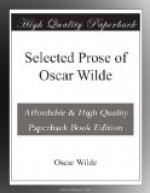What is true about the drama and the novel is no less true about those arts that we call the decorative arts. The whole history of these arts in Europe is the record of the struggle between Orientalism, with its frank rejection of imitation, its love of artistic convention, its dislike to the actual representation of any object in Nature, and our own imitative spirit. Wherever the former has been paramount, as in Byzantium, Sicily and Spain, by actual contact, or in the rest of Europe by the influence of the Crusades, we have had beautiful and imaginative work in which the visible things of life are transmuted into artistic conventions, and the things that Life has not are invented and fashioned for her delight. But wherever we have returned to Life and Nature, our work has always become vulgar, common and uninteresting. Modern tapestry, with its aerial effects, its elaborate perspective, its broad expanses of waste sky, its faithful and laborious realism, has no beauty whatsoever. The pictorial glass of Germany is absolutely detestable. We are beginning to weave possible carpets in England, but only because we have returned to the method and spirit of the East. Our rugs and carpets of twenty years ago, with their solemn depressing truths, their inane worship of Nature, their sordid reproductions of visible objects, have become, even to the Philistine, a source of laughter. A cultured Mahomedan once remarked to us, “You Christians are so occupied in misinterpreting the fourth commandment that you have never thought of making an artistic application of the second.” He was perfectly right, and the whole truth of the matter is this: The proper school to learn art in is not Life but Art.—The Decay of Lying.
THE INFLUENCE OF THE IMPRESSIONISTS ON CLIMATE
Where, if not from the Impressionists, do we get those wonderful brown fogs that come creeping down our streets, blurring the gas-lamps and changing the houses into monstrous shadows? To whom, if not to them and their master, do we owe the lovely silver mists that brood over our river, and turn to faint forms of fading grace curved bridge and swaying barge? The extraordinary change that has taken place in the climate of London during the last ten years is entirely due to a particular school of Art. You smile. Consider the matter from a scientific or a metaphysical point of view, and you will find that I am right. For what is Nature? Nature is no great mother who has borne us. She is our creation. It is in our brain that she quickens to life. Things are because we see them, and what we see, and how we see it, depends on the Arts that have influenced us. To look at a thing is very different from seeing a thing. One does not see anything until one sees its beauty. Then, and then only, does it come into existence. At present, people see fogs, not because there are fogs, but because poets




